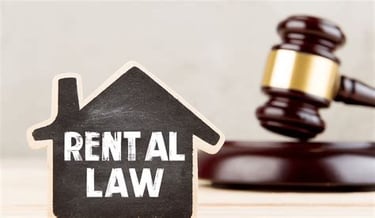Understanding the 30-Day Rental Law in the Thai Condo Act
Thailand has long been a popular destination for tourists and expatriates, with many choosing to rent condos for short-term stays. However, the Thai Condo Act has specific regulations regarding rental periods that both property owners and tenants must understand. The 30-day rental law is a crucial aspect of these regulations, determining what is legal and illegal when it comes to renting properties in Thailand.
Author: Mark Kreitzman - over 20 years experience investing in Thailand real estate, crypto/blockchain and cybersecurity expert
6/4/20242 min read


Understanding the 30-Day Rental Law in the Thai Condo Act: What You Need to Know
Thailand has long been a popular destination for tourists and expatriates, with many choosing to rent condos for short-term stays. However, the Thai Condo Act has specific regulations regarding rental periods that both property owners and tenants must understand. The 30-day rental law is a crucial aspect of these regulations, determining what is legal and illegal when it comes to renting properties in Thailand.
The 30-Day Rental Rule
According to the Thai Condo Act, renting out condominium units on a short-term basis (less than 30 days) is generally prohibited unless the condominium is officially registered as a hotel. This regulation aims to maintain the residential nature of condominiums and prevent disturbances to permanent residents caused by a constant influx of short-term renters.
Legal Rentals
1. Long-Term Rentals: Renting out a condo for 30 days or more is entirely legal. This includes monthly, yearly, or multi-year leases. Many expatriates and long-term tourists opt for these types of rentals, providing stability for both the tenant and the property owner.
2. Hotel-Registered Condominiums: Condos that have been registered as hotels can legally offer short-term rentals. These properties must comply with hotel regulations, including obtaining the necessary licenses and adhering to safety and service standards.
3. Serviced Apartments: Some buildings operate as serviced apartments and have the appropriate licenses to offer short-term stays. These establishments provide amenities and services similar to hotels, such as housekeeping and reception services, ensuring compliance with Thai law.
Illegal Rentals
1. Unlicensed Short-Term Rentals: Renting out a condo for less than 30 days without the proper hotel license is illegal. This applies to platforms like Airbnb, where many property owners list their condos for short-term stays without obtaining the necessary permissions.
2. Non-Compliance Penalties: Property owners who violate this law can face significant penalties, including fines and legal action. Tenants who rent such properties may also encounter issues, such as being asked to leave the premises without notice if authorities discover the illegal rental.
Enforcement and Compliance
Thai authorities have increasingly enforced the 30-day rental law in recent years. Condo juristic persons (the management bodies of condominium buildings) and local officials monitor compliance, ensuring that property owners adhere to the regulations. This enforcement helps maintain the quality of life for permanent residents and ensures that buildings retain their residential character.
What Renters Need to Know
For those looking to rent a condo in Thailand, it’s essential to verify the rental terms and ensure they comply with the Thai Condo Act. Prospective renters should:
- Check Lease Duration: Ensure that the rental period is at least 30 days unless the property is registered as a hotel or serviced apartment.
- Verify Licenses: If renting for a short-term period, confirm that the condo has the appropriate hotel registration and licenses.
- Understand Your Rights: Be aware of your rights and obligations under Thai law to avoid any potential legal issues during your stay.
Conclusion
The 30-day rental law in the Thai Condo Act is designed to preserve the residential nature of condominiums and prevent the issues associated with short-term rentals. By understanding and adhering to these regulations, both property owners and tenants can ensure a smooth and legal rental experience in Thailand. Whether for a long-term stay or a short-term vacation, complying with the Thai Condo Act is essential for a hassle-free experience in this beautiful country.
